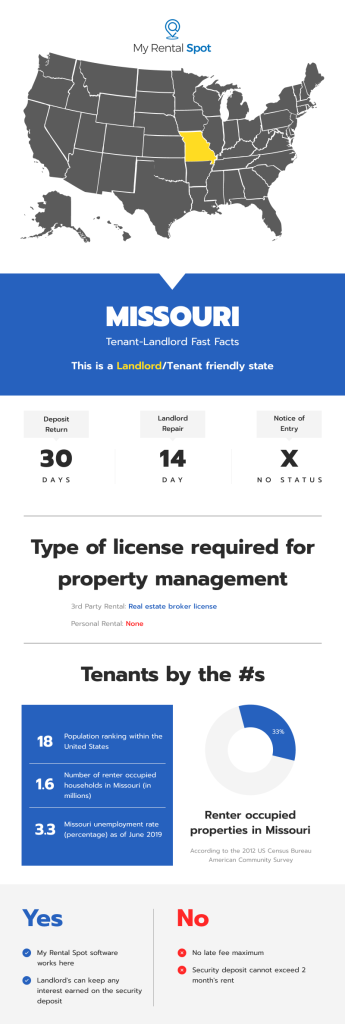Landlords and tenants will face legal issues during the rental process, but not every issue needs to involve the courts. This article will help you learn how the laws in your state handle everything from security deposits to termination notices so you can easily navigate these.
This article is not an exhaustive or a substitute for qualified legal advice. Laws and statutes are always subject to change and may vary by county or city. You are responsible for performing your research and complying with all laws applicable to your unique situation.
If you have legal questions or concerns, we recommend consulting with the appropriate government agencies and a qualified lawyer. Your state bar association may have a referral service to help you find a lawyer with experience in landlord-tenant law.

Official Rules and Regulations
- Mo. Rev. Stat. §§ 441.005-441.880 – Landlord and Tenant
- Mo. Rev. Stat. §§ 482.300-482.365 – Small Claims Courts
- Mo. Rev. Stat. §§ 535.010-535.300 – Landlord-Tenant Actions
- [GUIDE ] Missouri Attorney General’s Landlord-Tenant Law: The Rights and Responsibilities of Landlords and Tenants (PDF in English)
- [ GUIDE ] Scott Law Firm Guide to Missouri Landlord-Tenant Law
- [ GUIDE ] City of Independence Landlord & Tenant Guide (PDF)
- [ GUIDE ] City of Columbia Landlord & Tenant Resources
Details
Security Deposit:
- Security Deposit Maximum: No more than two months’ rent (§§ 535.300(1)).
- Security Deposit Interest: Any interest a security deposit earns is the landlord’s property (§§ 535.300(2)).
- Separate Security Deposit Bank Account: A landlord shall not commingle security deposits with other landlord funds, except as provided in section 339.105. All security deposits shall be held in a trust established by the landlord and deposited in a bank, credit union, or depository institution account in the landlord’s name. (§§ 535.300(2))
- Pet Deposits and Additional Fees: No statute.
- Non-Refundable Fees: No rule.
- The deadline for Returning Security Deposit is 30 days after lease termination (§§ 535.300(2)).
- Permitted Uses of the Deposit: The security deposit may be used to pay for:
- Unpaid rent;
- To pay for damages made to the unit beyond ordinary wear and tear;
- To compensate the landlord for damages resulting from the tenant’s failure to give adequate notice to terminate the tenancy, provided that the landlord makes reasonable efforts to mitigate damages (§§ 535.300(3)).
- Require Written Description/Itemized List of Damages and Charges: Yes (§§ 535.300(2)(2)).
- Record Keeping of Deposit Withholdings: No statute.
- Receipt of Deposit: No law.
- Failure to Comply: If the landlord wrongfully withholds the security deposit, the tenant can recover as damages up to twice the amount wrongfully withheld (§§ 535.300(5)).
Lease, Rent & Fees:
- Rent Is Due: As stated in the lease.
- Rent Increase Notice: No statute.
- Rent Grace Period: No law may be defined in the lease.
- Late Fees: No law, but may be specified in the lease.
- Prepaid Rent: No statute
- She returned Check Fees: $25, plus the amount of the fee charged by the bank for each returned check (§§ 570.120(6)(2)).
- Tenant Allowed to Withhold Rent for Failure to Provide Essential Services (Water, Heat, etc.): No however in the event that a heat-related utility service notifies tenants in a master-metered, multi-tenant building of an impending termination of service due to nonpayment, tenants may prevent the termination by promptly petitioning the associate division of the county circuit court for the property to be put into receivership. See the statute for further details (§§ 441.650).
- Tenant Allowed to Repair and Deduct Rent: Yes, with restrictions (§§ 441.234):
- The ability to make repairs and deduct the costs from rent is only applicable to a tenant who has lawfully resided on the rental premises for six consecutive months, has paid all rent and charges due the landlord during that time;
- The issue detrimentally affects the habitability of the unit or is a code violation;
- After 14-days written notice to the landlord for repairs of less than $300, or one-half of the periodic rent, whichever is greater, and
- Tenants may not deduct in the aggregate more than the amount of one month’s rent during any twelve months;
- Other notifications, requirements, and provisions apply (§§ 441.234).
- Landlord Allowed to Recover Court and Attorney Fees: No statute.
- Landlord Must Make a Reasonable Attempt to Mitigate Damages to Lessee, including an Attempt to Rerent: Yes (§§ 535.300(3)(3)).
- Early Termination Fee: No statute.
- Abandonment and Personal Property: Landlords may discard a tenant’s personal property if the tenant doesn’t respond to a formal written notice after ten days, among other criteria. See statute §§ 441.065 for details.
Notices and Entry:
- Notice to Terminate Tenancy – Fixed End Date in Lease: No notice is required as the lease ends (§§ 441.070).
- Notice to Terminate Tenancy – Yearly Lease with No End Date: 60-day written notice before the end of the year (§§ 441.050).
- Notice to Terminate Tenancy – Month-to-Month Lease: One-month written notice before a periodic rent-paying date (§§ 441.060(4)).
- Notice to Terminate Tenancy – Week-to-Week Lease: No statute.
- Termination of Tenancy with 24 Hours Notice: No statute.
- Immediate Eviction by Court Order: Expedited eviction of a tenant may be ordered by the court in cases in which:
- an emergency situation imminently threatens either the safety of other tenants or threatens to cause damage with costs that would exceed the rent for one year;
- the leased property was used to assist or promote any drug-related criminal activity;
- The tenant or member of the tenant’s household or guest has engaged in drug-related criminal activity either in or near the leased property;
- The tenant has given permission to, or invited a person to, enter onto or remain on any portion of the leased property, and the tenant did so knowing that the person had been removed or barred from the leased property. See statute for more details. (§§ 441.740)
- Notice of Date/Time of Move-Out Inspection: Landlords must give tenants reasonable notice in writing of the date and time the landlord has chosen for the move-out inspection. The inspection must be at a reasonable time and the tenant has the right to be present (§§ 535.300(4)).
- Notice of Termination for Nonpayment: If rent is unpaid when due, landlords may provide an immediate, unconditional quit notice (§§ 535.010).
- Termination for Lease Violation: 10-day notice. In addition to lease violations, a 10-day notice is required if the tenant has sublet the unit without the landlord’s written permission or permitted the premises to be used for prohibited gambling, prostitution or drug-related criminal activity. (§§ 441.020, §§ 441.030 and §§ 441.040).
- Required Notice before Entry: No statute.
- Entry Allowed with Notice for Maintenance and Repairs (non-emergency): No statute.
- Entry Allowed with Notice for Showings: No statute.
- Emergency Entry Allowed without Notice: No statute.
- Entry Allowed During Tenant’s Extended Absence: No statute.
- Notice to Tenants for Pesticide Use: No statute.
- Lockouts Allowed: No (§§ 441.233(1)).
- Utility Shut-offs Allowed: No (§§ 441.233(2)).
Disclosures and Miscellaneous Notes:
- Name and Addresses: Before the start of the tenancy, landlords must provide tenants, in writing, the name and address of the property manager as well as that of a property owner for the purpose of service of process and receipt of notices and demands. (§§ 535.185)
- Copy of the Lease: No statute.
- Landlord’s Duties: (Missouri Attorney General’s Guide to Landlord-Tenant Law (Pg. 5))
- Habitability: Make the property habitable before tenants move in;
- Repairs: Make and pay for repairs due to ordinary wear and tear.;
- Utilities: Refrain from turning off a tenant’s water, electricity, or gas;
- Transfer of Ownership: Provide written notice to tenants when
- ownership of the property is transferred to a new landlord;
- Discrimination: Not unlawfully discriminate.
- Tenant’s Duties: (§§ 441.630)
- Trash: Dispose of, in a clean and sanitary manner, all garbage and other organic waste in the unit;
- Electrical, Heating and Plumbing: Refrain from unreasonable use of electrical, heating, and plumbing fixtures;
- Compliance: Meet all obligations lawfully imposed on tenants by the code enforcement agency or the community;
- Damage: Refrain from willfully or wantonly destroying, defacing, damaging, impairing or removing any part of the structure, dwelling unit or facilities, and to prohibit any other person on the premises with his or her permission from doing likewise; and
- Subleasing: Shall not under any circumstances take in additional occupants, sublease, rent or turn over said premises to any persons without the owner’s knowledge and consent.
- Retaliation: No statute.
- Lead Disclosure: Landlords must disclose all known lead paint hazards. Landlords must also provide tenants, as an attachment to a written lease, with an information pamphlet on lead-based paint hazards.
- Disclosure of Prior Methamphetamine Manufacture (Meth Lab): Landlords must disclose, in writing, to prospective tenants or buyers any knowledge of past methamphetamine production on the premises, regardless of whether those involved were convicted for such production (§§ 441.236).
Court Related:
- Missouri Small Claims Court
- Limits: $5,000 (§§ 482.305)
- Eviction Cases Allowed in Small Claims: No, evictions are heard in circuit court.
- Missouri Small Claims Court Forms
- Missouri Small Claims Court Handbook (PDF)
- Missouri Circuit Courts
- Eviction Process: If rent is unpaid when due, landlord must first make a demand for the rent and may then file a statement, verified by affidavit, with the county circuit court describing the situation. The court would then issue a summons for the tenant to appear and show cause why possession of the property should not be restored to the landlord. See statutes for further details (§§ 535.020 and §§ 535.060).
- Statute of Limitations
- Written Contracts: 10 years (§§ 516.110)
- Oral Contracts: 5 years (§§ 516.120)
- Missouri Courts
- Missouri Attorney General
- The Missouri Bar
- Legal Aid:
Business Licenses:
- Business License Required: No statewide statute, but some cities and counties may have regulations and requirements. For example, Independence requires a landlord business license. Check with your local governing authority.
Helpful Links
State Agencies & Regulatory Bodies
- Missouri–U.S. Department of Housing and Urban Development
- Missouri Department of Insurance
- Missouri Housing Development Commission
- Missouri Inclusive Housing Development Corporation
- Housing and Utilities–Missouri.gov
- Homeowners Insurance Guide (Missouri Department of Insurance)
- Renters Insurance Guide (Missouri Department of Insurance)
- Missouri Real Estate Commission\
Housing Authorities
- Columbia Housing Authority
- Dallas County Housing Programs
- H.A.S. Properties (housing authority of Springfield, Missouri)
- Housing Authority of Kansas City, Missouri
- Housing Authority of St. Louis County
- Jasper County Public Housing Authority
- Jefferson-Franklin County Community Action Corporation
- Jefferson City Housing Authority
- Kirksville Housing Authority
- Ozark Action, Inc.
- St. Louis Housing Authority
Realtor, Landlord, and Tenant Associations
- REALTORS® Associations
- Landlord & Real Estate Investor Associations
- Missouri Apartment Association
- Springfield Apartment & Housing Association
- St. Louis Apartment Association
- Southwest Missouri Rental Housing Association
- Apartment Association of Kansas City
- Mid-Missouri Apartment Association
- Landlord’s Association of Eastern Jackson County
- St. Louis Real Estate Investors Association
- Missouri Property Owners Association
- Tenant and Affordable Housing Organizations
